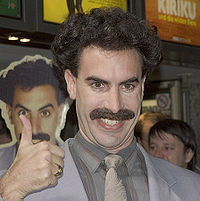Da Ali G Show: Difference between revisions
| Line 69: | Line 69: | ||
In the interview [[Ali G]] at one point violates proper [[English language|English]] [[syntax]] by asking the question, "Does you think the media has changed?" Visibly irritated, Rooney immediately corrects him. When [[Ali G]] asks the same question again without correcting himself, Rooney makes a gesture towards a bookcase that lines the back wall of his office and says, "I have over 50 books on the English language here if you'd like to borrow one." |
In the interview [[Ali G]] at one point violates proper [[English language|English]] [[syntax]] by asking the question, "Does you think the media has changed?" Visibly irritated, Rooney immediately corrects him. When [[Ali G]] asks the same question again without correcting himself, Rooney makes a gesture towards a bookcase that lines the back wall of his office and says, "I have over 50 books on the English language here if you'd like to borrow one." |
||
Later, [[Rooney]] becomes flustered again when [[Ali G]] makes a thinly-veiled reference to the [[United States presidential election, 1948|1948 |
Later, [[Rooney]] becomes flustered again when [[Ali G]] makes a thinly-veiled reference to the [[United States presidential election, 1948|1948]] not picking up on the historical reference, debates [[Ali G]] on the impossible logic of reporting news before it happens. [[Ali G]] becomes persistent with the question, until Rooney becomes exasperated to the point where he abruptly and prematurely tries to end the interview. As Rooney stands up to get [[Ali G]] to leave, [[Ali G]] asks, "Is it because I is black?," and adds, "You'se a racialist." |
||
Rooney chuckles and corrects him by saying "racist," perhaps implying that the word "racialist" does not exist. [[Racialist|Racialism]] is, in fact, a real word, and [[Ali G]]'s usage of it is correct in the context in which it was spoken (however uncommon in American English). |
Rooney chuckles and corrects him by saying "racist," perhaps implying that the word "racialist" does not exist. [[Racialist|Racialism]] is, in fact, a real word, and [[Ali G]]'s usage of it is correct in the context in which it was spoken (however uncommon in American English). |
||
Revision as of 17:32, 28 January 2007
| Da Ali G Show | |
|---|---|
| File:Da Ali G Show.jpg | |
| Starring | Sacha Baron Cohen |
| Country of origin | UK, USA |
| No. of episodes | 6 (UK) 12 (USA) |
| Production | |
| Running time | approx. 30 minutes |
| Original release | |
| Network | Channel 4, HBO |
| Release | 2000 (UK); February 21, 2003 – August 22, 2004 (USA) |
Da Ali G Show was the name of two related satirical TV series starring British comedian Sacha Baron Cohen and featuring the character Ali G.
The original (single season) series was made by Channel 4 in the UK, and the second (two season) series by HBO in the US. The UK series has not been shown in the US, and the second series was known as Ali G in da USA in countries where the original series had screened.
Baron Cohen played three bumbling journalists — Ali G, Borat Sagdiyev, and Bruno — who interview unsuspecting people (sometimes very high-ranking officials) and make them look foolish. His exposure of this foolishness using these ignorant characters makes the show an excellent example of Socratic irony.
On July 23, 2005 HBO announced they have no plans to make an additional season of the show [1]. Some said that Baron Cohen's celebrity status prevents his interview subjects from mistaking him for a bumbling journalist.
Characters
Ali G

Ali G is the main character of Da Ali G Show. He is the self-proclaimed "voice of da yoof" and the leader of the West Staines Massiv. His speech and mannerisms are a mix of stereotypical and often exaggerated British Afro-Caribbean and hip hop cultures, with some American ghetto influences thrown in. He interviews unsuspecting guests, often telling them he is a British talk show host and wants to discuss the media and politics. Other times he tells his guests that he is teaching civics to British teens. He often asks a question, and upon receiving an answer, instantly creates a story of an event relevant to the topic, employing his neighbors and fellow gangsters Ricky C and (Dangerous) Dave, while the interviewee looks on in confusion. Regardless of his method of procuring the interview, the outcome is often the same—he sits down with his guests, and then asks a string of loaded questions devised to goad them into replying with something equally ridiculous. The character later was the basis of the film Ali G Indahouse.
Borat

Borat Sagdiyev is another character featured frequently on the show. He comes from Kazakhstan, and travels around the United Kingdom and United States interviewing people and engaging in their activities. Borat often makes his guests feel uncomfortable by introducing them to "Kazakh" customs, or by making misogynistic, anti-Semitic, or otherwise inappropriate comments based on his unfamiliar culture. Borat makes several references to his favorite sport called "shurik", a "Kazakh" custom where dogs are shot and killed in a field. He also makes references to his dead wife and his desire to have "sexy time" with many of his interviewees. A highly successful movie based on the Borat character, titled Borat: Cultural Learnings of America for Make Benefit Glorious Nation of Kazakhstan, was released by 20th Century Fox on November 3, 2006.
Bruno

Bruno is a homosexual Austrian and is the third and least used character of Da Ali G Show. He claims to be the voice of Austrian youth television, and makes others uncomfortable by flaunting his apparent homosexuality. In one episode, Bruno performs cheers with exaggerated, limp-wristed, stereotypically gay mannerisms, along with University of Alabama cheerleaders, provoking the ire of some Crimson Tide fans during the 2002 Alabama-Mississippi State football game.
Bruno also interviews fashion aficionados and 'party people' and exposes their extreme views of how unfashionable people should be treated and aims to show the superficiality, hypocrisy and inconsistency of the fashion world. For example, he gets them to say that they think fashion has saved more lives than doctors, that people who have bad fashion should be sent to concentration camps, that Osama Bin Laden looks cool and that if house music were around in the 1930s, it would have prevented World War II. As with Baron Cohen's other two main characters, Bruno will have a movie based around his character, to be produced by Universal Pictures.
Episodes
Channel 4
- 101 - Neil Hamilton
- 102 - Mohammed Al Fayed
- 103 - Gail Porter
- 104 - Roy Hattersley
- 105 - John Humphrys
- 106 - Anita Roddick
HBO
Controversy
The methods used by Baron Cohen often cause considerable controversy. Some guests become upset upon learning they've been tricked and various comments made on the show have caused outrage with viewers. In one episode, Borat went to a bar in Tucson, Arizona and sang a song about Jews, in which he said, "Throw the Jew down the well/so my country can be free/you must grab him by his horns/then we have a big party." Many patrons of the bar were shown responding gleefully and singing along (though an investigation by the Jewish Daily Forward found that many or all of the audience were aware that the song was meant to be funny, and that one of them was in fact Jewish herself[1]). A prominent Jewish anti-racism group, the Anti-Defamation League, complained about this segment. HBO spokesman Quentin Schaffer replied, "Through his alter-egos, he delivers an obvious satire that exposes people's ignorance and prejudice in much the way All in the Family did years ago." [2] In real life, Sacha Baron Cohen is himself an "observant Jew."[2] Baron Cohen, in an interview, has explained his character's racist nature by stating that the show's 'Borat' segments are a "dramatic demonstration of how racism feeds on dumb conformity, as much as rabid bigotry," rather than a display of racism by Baron Cohen himself.[3]
One upset interviewee was James Broadwater, a Republican candidate for U.S. Congress. He was interviewed by Borat, who told him that the interview would be played in Kazakhstan and other foreign countries to teach others about the American political system. Borat's questioning led Broadwater to state that Jews would go to Hell if they did not follow the Christian religion. This comment upset some Jewish communities, and prompted Broadwater to post a letter on his website denouncing Da Ali G Show, demanding the FCC exert greater control over "the liberal, anti-God media" and stating "I have had a logo on my website which says, 'I am a proud friend of Israel.'" .[3]
Appearance on Da Ali G Show (The Rooney Ruse)
In the interview Ali G at one point violates proper English syntax by asking the question, "Does you think the media has changed?" Visibly irritated, Rooney immediately corrects him. When Ali G asks the same question again without correcting himself, Rooney makes a gesture towards a bookcase that lines the back wall of his office and says, "I have over 50 books on the English language here if you'd like to borrow one."
Later, Rooney becomes flustered again when Ali G makes a thinly-veiled reference to the 1948 not picking up on the historical reference, debates Ali G on the impossible logic of reporting news before it happens. Ali G becomes persistent with the question, until Rooney becomes exasperated to the point where he abruptly and prematurely tries to end the interview. As Rooney stands up to get Ali G to leave, Ali G asks, "Is it because I is black?," and adds, "You'se a racialist."
Rooney chuckles and corrects him by saying "racist," perhaps implying that the word "racialist" does not exist. Racialism is, in fact, a real word, and Ali G's usage of it is correct in the context in which it was spoken (however uncommon in American English).
Critics claim that Sacha Baron Cohen's "Rooney Ruse" is exploitative because it is unfair to deceive a man who is more than 80-years-old and who would likely be unfamiliar with ebonics (acceptablility in a formal interview is debatable at best). Others counter by saying that Rooney's advanced age should have made him familiar with the 1948 U.S. presidential election and the word racialist, especially since eugenics may have been a popular philosophy during the time in which Rooney was raised (reference required.)
One might argue that the existence of the concept of eugenics or the use of the term racialist within the circle of eugenics proponents does not suggest the Mr. Rooney should be familiar with the term or was wrong to correct someone with the more common term, racist. Perhaps he wasclarifying the implication of bias by denying the use of a more obscure term. As in "let's not mince words, you are calling me a racist and I am dismissing it because it is unfounded".
Differences
There are some differences between the versions of Da Ali G Show shown on Channel 4 and HBO.
Channel 4:
- Features studio interviews and location interviews.
- Location interviews take place in Europe and some parts of the USA
- Contains scripted segments
- Contains monologues
- Contains skits
- Contains guest music performances (which Ali G would deliberately ruin).
- Has a laugh track
HBO:
- Features only location interviews
- Takes place in USA
- Unscripted performance
- Has no studio monologues, skits or music performances.
- Has no laugh track
References
- ^ "Comic Pushes Limits in Antisemitic Sing-along", Nathaniel Popper, Jewish Daily Forward, August 13, 2004
- ^ "The Borat Doctrine" by Daniel Radosh, The New Yorker.
- ^ http://news.independent.co.uk/people/profiles/story.jsp?story=553818
There are monologues in which Ali G Stands in Front of huge letters spelling out the title of the episode
